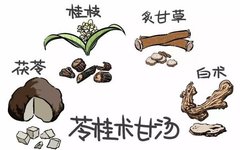Click the blue text above to follow us
In southern climates, where rainfall is abundant, especially during the spring and summer seasons and the plum rain period, people often say they have excessive dampness. What is dampness evil? Dampness evil is a disease that can be categorized into external dampness and internal dampness. External dampness originates from the natural environment, such as humid climates, living conditions, or exposure to water and rain, which can allow dampness to infiltrate the body. Depending on the individual’s constitution, it can transform into damp-heat or cold-damp evil. Internal dampness arises from irregular eating habits or excessive consumption of rich, fatty, cold, and damp foods, leading to damage to the internal organs, particularly the spleen and stomach, resulting in water and dampness stagnating within the body. External dampness can invade the internal organs, while internal dampness can also manifest on the skin. Internal and external dampness can influence each other, and their combined effects can lead to spleen dysfunction, poor circulation of qi and blood in the limbs, and a series of symptoms. So how can we eliminate dampness? There are many formulas for dispelling dampness, and one of the most famous ancient formulas recorded in the “Essentials of the Golden Chamber” by the renowned physician Zhang Zhongjing is the Ling Gui Zhu Gan Decoction. As the ancestor of dampness-eliminating formulas, many subsequent formulas have been derived from it. Today, let us explore this formula together.
Ling Gui Zhu Gan Decoction
From the “Essentials of the Golden Chamber”
【Ingredients】
Fu Ling (Poria) 12g, Gui Zhi (Cinnamon Twig) 9g, Bai Zhu (White Atractylodes) 6g, Zhi Gan Cao (Honey-fried Licorice) 6g
【Functions】
Warming yang, transforming fluids, strengthening the spleen, and promoting dampness elimination.
【Indications】
Phlegm-damp due to deficiency of middle yang. Symptoms include fullness in the chest and flanks, dizziness, palpitations, shortness of breath with cough, white and slippery tongue coating, and a wiry or slippery pulse.
【Clinical Applications】
Chronic bronchitis, bronchial asthma, cardiogenic edema, edema from chronic glomerulonephritis, Ménière’s disease, and neuroses associated with water retention in the middle jiao.
【Formula Analysis】
Chief Herbs
Fu Ling: Strengthens the spleen and promotes urination, transforms dampness and phlegm, eliminating accumulated phlegm and preventing upward counterflow of phlegm evil.
Gui Zhi: Warms yang and transforms qi, harmonizing and descending counterflow. It works with the chief herb to enhance the fluid-transforming and damp-eliminating effects.
Deputy Herbs
Bai Zhu: Strengthens the spleen and dries dampness, assisting in the transformation and transportation to prevent the generation of phlegm. It works with Gui Zhi to warm and support middle yang and with Fu Ling to strengthen the spleen and eliminate dampness.
Envoy Herbs
Zhi Gan Cao: Tonifies the spleen and benefits qi, assisting Gui Zhi in transforming yang qi, moderating Fu Ling to prevent excessive dampness elimination that could harm fluids, and harmonizing the other herbs.
【Compatibility Characteristics】
This formula is warm but not drying, beneficial but not harsh, addressing both symptoms and root causes, and is meticulously formulated for treating phlegm-damp conditions.
【Usage Precautions】
If the dampness evil transforms into heat, resulting in thick and sticky phlegm, this formula is not suitable. During the use of this formula, dietary and lifestyle adjustments are necessary to avoid excessive consumption of cold, greasy, and spicy foods, maintain a regular schedule, and ensure adequate sleep.
Warm Reminder
In daily life, sweating is also a good method to eliminate dampness, especially for those who often stay in air-conditioned environments. It is essential to find opportunities to sweat; otherwise, dampness can become too heavy. Moderate daily exercise such as running, brisk walking, ball sports, yoga, and Tai Chi is very beneficial for the body. It not only relieves stress and promotes organ function but also enhances fluid metabolism, balances hormone secretion, improves the body’s resistance to diseases, aids digestion, and promotes the circulation of qi and blood, thereby eliminating internal dampness.
References:
[1] Deng Zhongjia. Formulary Studies [M]. Beijing: China Traditional Chinese Medicine Press, 2003
Note: Some images in the article are sourced from the internet, and we thank the authors of these images!
Author: Cai Liuping, Pharmacy Department, Dongguan Tea Mountain Hospital
Reviewed by: Shi Yuping, Pharmacy Department, Dongguan Tea Mountain Hospital
Edited by: Zhong Chongjie, Pharmacy Department, Dongguan Tea Mountain Hospital

